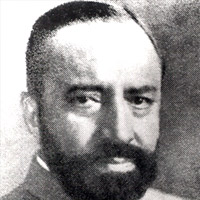Abdullah Haroon facts for kids
Quick facts for kids
Abdullah Haroon
|
|
|---|---|
 |
|
| Born |
Abdullah Haroon (Urdu: عبداللہ ہارون)
1872 Karachi, British India
|
| Died | 27 April 1942 (aged 69–70) Karachi, British India
|
| Nationality | Indian |
| Known for | Politics (Pakistan Movement leader), Philanthropy |
| Spouse(s) | Lady Abdullah Haroon |
| Children | Yusuf Haroon, Mahmoud Haroon, and Zeenat Haroon Rashid |
Sir Abdullah Haroon (born January 1, 1872 – died April 27, 1942) was an important leader from British India. He was a politician and a very successful businessman. He helped Muslims in the Indian subcontinent in many ways. He worked to improve their lives in business, education, and politics.
Contents
Early Life and Business Success
Abdullah Haroon was born into a Kutchi Memon family. He lost his father when he was only four years old. His grandmother, who was very religious, raised him.
When he was young, he worked as an assistant bicycle repairman. He earned a small amount of money, just 4 annas. This showed he believed in the value of hard work.
In 1896, at the age of 24, he started his own business. He began as a small merchant in Karachi. He quickly became very successful. People called him Sindh's 'Sugar King' because he traded a lot in sugar.
Joining Politics and Public Service
In 1901, Abdullah Haroon became interested in politics. He joined the Karachi Municipality, which is like a local city council. He was a member from 1913 to 1916, and again from 1921 to 1934.
In 1917, he joined the Indian National Congress party. He wanted to help India gain independence from British rule. However, he soon disagreed with their ideas.
He then joined the All-India Muslim League party. He remained a strong supporter of this party for the rest of his life. In 1919, he became the head of the Khilafat Committee in Sindh. This committee was part of a larger movement led by Muhammad Ali Jouhar.
He also led the Sindh Provincial Muslim League from 1920 to 1930.
Working for Sindh and Muslim Rights
In 1930, Abdullah Haroon attended the All-India Muslim Conference. In the same year, he created the Sind United Party. This party wanted Sindh to become a separate province. At that time, Sindh was part of the Bombay Presidency.
Thanks to efforts like his, Sindh became a separate province in April 1936. This happened after a new law called the Government of India Act, 1935, was passed.
Abdullah Haroon officially joined the All-India Muslim League in 1937. He was honored by King George VI in 1937. He received the title 'Sir' and became known as Sir Abdullah Haroon.
In 1938, he helped organize the All-India Muslim League in Sindh. He was elected its president in 1939.
The Pakistan Resolution
In October 1938, Sir Abdullah Haroon organized a big meeting in Karachi. It was the First Sind Provincial Muslim League Conference. Muhammad Ali Jinnah, a very important leader, led this meeting. Leaders from all over India attended.
Sir Abdullah Haroon gave a speech that was very bold for its time. He warned that India might have to be divided into a Hindu India and a Muslim India. This idea helped prepare the way for the Lahore Resolution.
Later, he was part of the Muslim League committee that wrote the 'Pakistan Resolution'. This important resolution was approved on March 23, 1940, in Lahore. It called for a separate homeland for Muslims.
Death and Lasting Impact
Sir Abdullah Haroon passed away on April 27, 1942, in Karachi. He was known for his generosity. He donated a large sum of money to the Muslim League in 1942.
He was a philanthropist, meaning he loved to help people. He was active in many social welfare projects throughout his life. He gave money to many charities. It is said he gave away a huge amount, which would be like 10 million rupees today.
To honor him, Pakistan Post issued a special postage stamp. It was part of their 'Pioneers of Freedom' series.
Sir Abdullah Haroon was so honest that even Mahatma Gandhi trusted him completely. Gandhi once said, "I will trust this man with a blank cheque."
Today, a major street in Karachi is named after him. It is called Abdullah Haroon Road.

